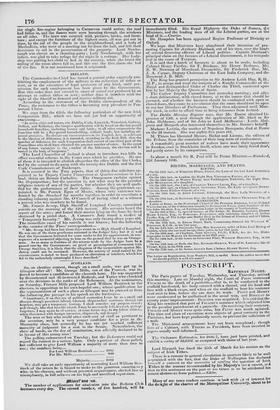IRELAND.
The Commander-in.Chief has issued a general order expressly pro- hibiting the employment of the military in the collection of tithes or rent, or in the execution of legal processes of any kind, until per- mission for such employment has been given by the Government. But this order does not extend to eases of actual riot produced by an attempt to collect tithes or rent ; neither does it interfere with the right of the Sheriff to demand and receive military aid. According to the statement of the Dublin correspondent of the Times, the resistance to the tithes is becoming very prevalent in Pro- testant Ulster.
We copy from the Globe the following particulars of the new Irish Corporation lull; which we have not yet had an opportunity of examining- " In seven cities and towns, viz. Dublin, Cork, Limerick, Waterford, Galway, Belfast, and Kilkenny-, the burgess qualification will be based on the ten-pound household franchise, including houses and lands ; in all other corpolations the franchise will be a five-pound householding, without lands, but including ad- j.accnt premises. To obviate one inconvenience in the English Act, in reference to the election of Aldermen, it is intender!, according to the Irish Bill, that the number of Aldermen for each Corporation shall consist of one-third part of the Councillors who shall have obtained the greatest number of votes. In the event of any future vacancies in the Lumber of the Aldermen, the election will be vested in the body of burgesses."
The Lord Chancellor of Ireland is about to introduce two bills to effect essential reforms in the Court over which lie presides. By one of them it is intended to abolish altogether the office of the Six Cferks, and by the second to do away with the twenty-five Dublin and the five Cork Commissioners of Bankrupts. It is asserted in the Tory papers, that of thirty-five solicitors ap-
pointed to be Deputy Crown Prosecutors at Qual ter-sessions in Ice- land, thirty are Roman Catholics. The Orangemen exclaim against the disproportion ; but the question is, not what may be the peculiar religious tenets of any of the parties, but whether they are well quali- fied for the performance of their duties. Among the gentlemen ap- pointed, is Mr. Patrick Egan of Monte, whose very existence was denied by the Standard for months together, in order to constitute a standing calumny against Mr. O'Connell of having cited as a witness a person who was nowhere to be found.
Mr. Francis Jessop, High Sheriff of Longford County, committed
suicide on the morning of the 12th instant. His servants heard the report of fire arms ; and found their master lying on the floor, his head shattered by a pistol-shot. A Coroner's Jury found a verdict of "Temporary Insanity." Mr. Jessop was only twenty-three years old. The immediate cause of his suicide is not known ; but the following is the surmise of the Times' correspondent- " Mr. Jessop had been but three days sworn in as High Sheriff of Longford. He was one of the three gentlemen returned in the Judges' list ; but it is said that the Government hesitated for some weeks to fiat his appointment, in con- sequence of a memorial objecting to him on the ground that he was an Orange- man. As so many as fourteen of the returns made by the Judges have be n passed over by the Government, on proof or presumption of connexion with Orange Societies, it is likely that the allegation of the memorialists against Mr. Jessup could not be sustained. however, the anxiety of mind caused by the circumstance is stated to have produced on aberration of intellect, which has led to the melancholy catastrophe I have described."


























 Previous page
Previous page